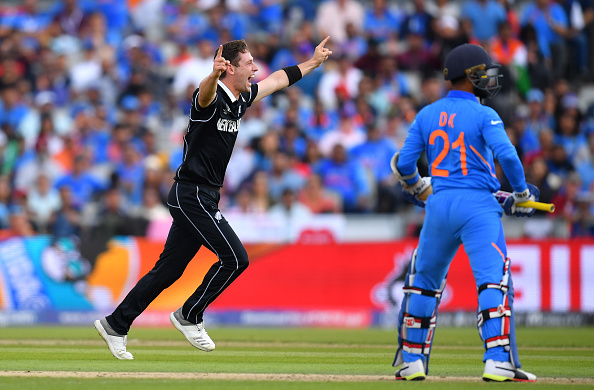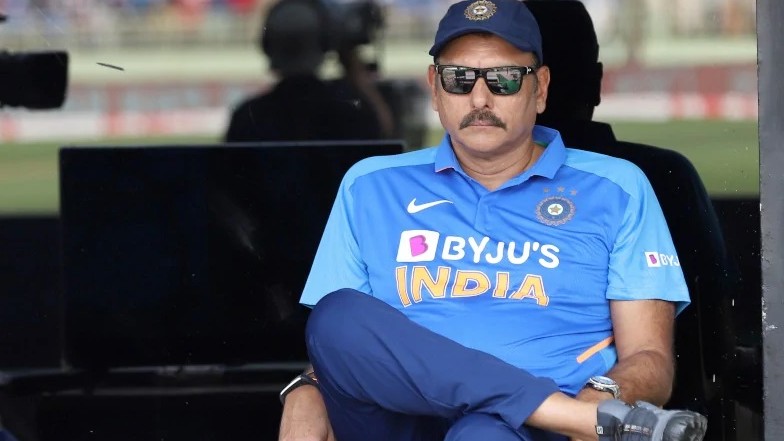 A question that kept everyone intrigued after India's defeat against New Zealand in the World Cup 2019 semi-final was – why Dinesh Karthik and Hardik Pandya were sent ahead of MS Dhoni in the batting order?
A question that kept everyone intrigued after India's defeat against New Zealand in the World Cup 2019 semi-final was – why Dinesh Karthik and Hardik Pandya were sent ahead of MS Dhoni in the batting order?
India had found themselves in trouble with three down for just five runs and needed someone like Dhoni to arrest the collapse, but the team management decided to play him at No. 7.
Karthik, who batted at No. 5 in that all-important match, was also left surprised by his promotion in the batting order.
See Also: Dinesh Karthik still optimistic about his T20I comeback
"It came as a bit of a surprise to me (walking in to bat at five) because they had made it very clear that I would be batting at number seven," Karthik told Cricbuzz.
"But they didn't expect something like that to happen because we were going pretty strong in the tournament. Rohit was batting so well, you always have Virat, Shikhar had done well till he left. The middle order typically didn't get enough opportunities to bat, and that is one of the harder ones you know. When the middle order doesn't get to bat and suddenly are pushed into a big game like this and thrust into such a situation.
"There were many games when a lot of the middle order didn't even get to bat. It was a hard thing because someone like Dhoni likes to play an x number of balls in a tournament especially leading up to the semi-final. It could be hard in that tournament. You could have the experience, yes, a player like Dhoni has played 300 games, but a World Cup semi-final is a World Cup semi-final. It has its beauty and the pressure around it. And everybody deep down somewhere felt that this could happen in a game, and it so happened in the semi-final," he explained.
The pressure was telling once India lost its top three cheaply and Karthik was again the fall guy of the team management's experiment.
"We had to send a rearguard action just to stem the flow of wickets. I was told to pad up and it all happened in a daze, in a hurry. I was just sitting in my shorts and I had to go up, get ready. Literally, I was late to get in, I wasn't expecting a wicket to fall. KL (Rahul) got out and I had to put on my pads.
"Throughout the tournament it was pretty clear that I was going to bat below Dhoni at number seven. I had done that really well in the past. In Australia we'd finished games, in New Zealand we'd finished games. I had not batted at number five for a couple of years or more. Here I got the opportunity, I went and did the job that was asked of me for the team, which was to arrest wickets."
Although Karthik managed to spend time on the wicket, he failed to keep the scoreboard ticking. Matt Henry eventually removed him, courtesy a stunner at point by Jimmy Neesham, in the 10th over for 25-ball 6.
"I went in in the third over and I don't know when I got out, and it doesn't matter, but I just stopped the wickets falling till Boult's spell was over. He was the main wrecker-in-chief and unluckily when it was time for me to move on, I got out to a brilliant catch by James Neesham," he said.
Thanks to a 116-run stand for the seventh wicket between Dhoni and Ravindra Jadeja, India made a comeback in the semi-final. But after Jadeja’s dismissal on 59-ball 77, the Men in Blue had too much to do.
Dhoni had a tough task (30 runs off 12 balls) at hand which he might have pulled off if it was not for Martin Guptill’s direct-hit. The veteran wicketkeeper was run out for 72-ball 50 in the penultimate over as India eventually fell 18 short of New Zealand’s 240-run target.
"Deep down everybody knew that the only way to beat India was to get those early wickets. The game was a bit of an irritating game for the players, because you win a toss and we wanted to bowl so that we could play in the evenings. Obviously in England it is easier to bowl when the sun is out and it is overcast, so everything of that kind was lost. We had to bowl three overs the next day. It felt like a two-inning game, we had to come and play the next day, with lesser crowd and the whole feel to the game was different going into the second day," Karthik remarked.
"But we still had them to a decent score at 240 (211/5) going into that day and they got to 260 (240). 260, let's say, is a good score. If they had put up in a bilateral in England, we would have ended up with 261/2, that's how it would have probably panned out.
“But World Cup semi-final has the pressure attached to it and everybody could obviously feel it, sense it. That's the difference between playing a multi-nation tournament and a bilateral. That's where consistency in backing the players, consistency in making them feel part of it and all these small things comes into play," he concluded.



